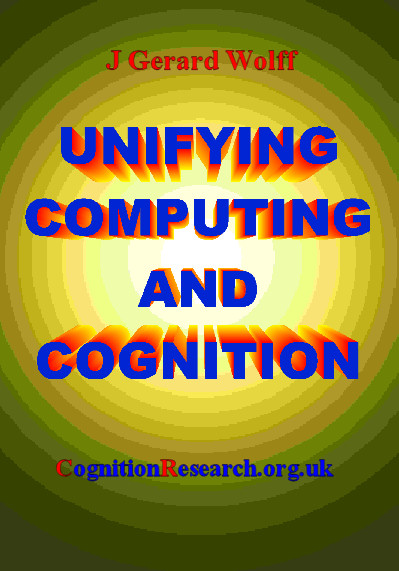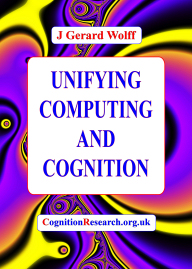|
|
|
| UNIFYING COMPUTING AND COGNITION
The SP Theory and its Applications
J Gerard Wolff
CognitionResearch.org,
2006, ISBN 0-9550726-0-3 (ebook edition),
ISBN 0-9550726-1-1 (print edition) |
| |
|
 |
 |
| Ebook cover |
Print edition cover |
The SP theory is a radical synthesis of ideas across human perception, cognition and
development, artificial intelligence, computer science, theoretical linguistics,
neuroscience, mathematics, logic, and epistemology. It is a theory of
information processing in all kinds of system, both natural and
artificial, a new paradigm for information processing which incorporates
principles of minimum length encoding pioneered by Ray Solomonoff and others, but which is built from new foundations.
The SP theory has a dual role. It is a theory of engineering, the basis for a
proposed SP machine with applications in artificial intelligence and in
data storage and retrieval. At the same time, it is a theory of information
processing in brains and nervous systems both at an abstract level and at the
more concrete level of neurons and neural processing.
The theory and its applications—which are the subject of this
book—will be of interest to researchers, academics,
professionals and students in computer science (especially artificial
intelligence), cognitive science, human perception, cognition and development,
theoretical and computational linguistics, neuroscience, mathematics, logic, and
the philosophy of mind and language.
The SP theory has a sound mathematical framework but the ideas are presented in
a way that will be accessible to a wide audience, without being overburdened
with mathematical equations or logical notations.
After the Introduction, Chapter 2 describes ideas and observations on which the
SP theory is founded, that have provided some motivation for the development of
the theory, or are simply part of the background thinking for the theory.
Chapter 3 describes the theory itself and one of the main computer models in
which the theory is embodied. And Chapter 4 shows how the SP theory can model
the operation of a universal Turing machine and describes advantages of the
theory compared with earlier theories of computing.
In Chapters that follow, applications of the SP theory are explored: in the
processing of natural languages, in pattern recognition and information
retrieval, in various kinds of probabilistic reasoning, in planning and problem
solving, in the unsupervised learning of new knowledge (with a second computer
model), and in the interpretation of concepts in mathematics and logic.
Further chapters describe how the abstract theory may be realised with neural
structures and neural processes, how the SP theory relates to some current
themes in cognitive psychology and how the SP theory and projected 'SP machine'
may be developed in the future.
An Appendix describes the version of dynamic programming that forms the core of
the SP computer models, with significant advantages compared with standard forms
of dynamic programming.
“A broad and detailed exploration of the implications of
compression for computation and cognition, by one of the pioneers in the field.” Prof. Nick Chater, Department of Psychology, University of Warwick.
“A sophisticated approach to understanding the inferential
potential of information compression. Wolff shows that the same computational
machinery can be successfully applied in areas as diverse as logic, perception,
and language acquisition. The unifying quality and mathematical elegance of his
formalism make it an important contender amongst paradigms for machine learning
and cognitive modelling alike.” Dr Emmanuel Pothos, Department of
Psychology, University of Wales, Swansea.
For a review copy of the book, please email Gerry Wolff.
To buy a copy (ebook edition or print edition), click on Ordering the book.
 Dr
Gerry Wolff, BA (Cantab), PhD (Wales), CEng, MBCS (CITP), is Director of CognitionResearch.org.
Previously, he held academic posts in the School of Informatics, University of
Wales, Bangor, the Department of Psychology, University of Dundee, and the
University Hospital of Wales, Cardiff. He has held a Research Fellowship with
IBM in Winchester, UK, and he has worked for four years as a Software Engineer
with Praxis Systems plc in Bath, UK. His first degree at Cambridge University
was in Natural Sciences (specialising in Experimental Psychology) and his PhD at
the University of Wales, Cardiff, was in the area of Cognitive Science. He is a
Chartered Engineer and Member of the British Computer Society (Chartered IT
Professional). Since 1987 his research has focussed on the development of the SP
theory. Previously, his main research interests were in developing computer
models of language learning. He has numerous publications in a wide range of
journals, collected papers and conference proceedings. Further information may
be found at: www.cognitionresearch.org. Dr
Gerry Wolff, BA (Cantab), PhD (Wales), CEng, MBCS (CITP), is Director of CognitionResearch.org.
Previously, he held academic posts in the School of Informatics, University of
Wales, Bangor, the Department of Psychology, University of Dundee, and the
University Hospital of Wales, Cardiff. He has held a Research Fellowship with
IBM in Winchester, UK, and he has worked for four years as a Software Engineer
with Praxis Systems plc in Bath, UK. His first degree at Cambridge University
was in Natural Sciences (specialising in Experimental Psychology) and his PhD at
the University of Wales, Cardiff, was in the area of Cognitive Science. He is a
Chartered Engineer and Member of the British Computer Society (Chartered IT
Professional). Since 1987 his research has focussed on the development of the SP
theory. Previously, his main research interests were in developing computer
models of language learning. He has numerous publications in a wide range of
journals, collected papers and conference proceedings. Further information may
be found at: www.cognitionresearch.org.
|


 Dr
Gerry Wolff, BA (Cantab), PhD (Wales), CEng, MBCS (CITP), is Director of CognitionResearch.org.
Previously, he held academic posts in the School of Informatics, University of
Wales, Bangor, the Department of Psychology, University of Dundee, and the
University Hospital of Wales, Cardiff. He has held a Research Fellowship with
IBM in Winchester, UK, and he has worked for four years as a Software Engineer
with Praxis Systems plc in Bath, UK. His first degree at Cambridge University
was in Natural Sciences (specialising in Experimental Psychology) and his PhD at
the University of Wales, Cardiff, was in the area of Cognitive Science. He is a
Chartered Engineer and Member of the British Computer Society (Chartered IT
Professional). Since 1987 his research has focussed on the development of the SP
theory. Previously, his main research interests were in developing computer
models of language learning. He has numerous publications in a wide range of
journals, collected papers and conference proceedings. Further information may
be found at:
Dr
Gerry Wolff, BA (Cantab), PhD (Wales), CEng, MBCS (CITP), is Director of CognitionResearch.org.
Previously, he held academic posts in the School of Informatics, University of
Wales, Bangor, the Department of Psychology, University of Dundee, and the
University Hospital of Wales, Cardiff. He has held a Research Fellowship with
IBM in Winchester, UK, and he has worked for four years as a Software Engineer
with Praxis Systems plc in Bath, UK. His first degree at Cambridge University
was in Natural Sciences (specialising in Experimental Psychology) and his PhD at
the University of Wales, Cardiff, was in the area of Cognitive Science. He is a
Chartered Engineer and Member of the British Computer Society (Chartered IT
Professional). Since 1987 his research has focussed on the development of the SP
theory. Previously, his main research interests were in developing computer
models of language learning. He has numerous publications in a wide range of
journals, collected papers and conference proceedings. Further information may
be found at: